Analyzing Men's Sheds: Health, Well-being, and Social Factors
VerifiedAdded on 2023/06/18
|9
|2846
|149
Essay
AI Summary
This essay examines the Men's Sheds intervention, a gender-specific approach originating in Australia and adopted in the UK, designed to improve men's health and well-being. It addresses the issue of lower life expectancy and higher susceptibility to diseases among men, often linked to harmful practices and a reluctance to seek healthcare. The Men's Sheds model provides a safe and supportive environment for men to engage in recreational activities, enhancing their mental, social, emotional, and physical health. The essay also considers the social determinants of health that can impact the success of this intervention, such as poverty, lack of education, and stigma. Ultimately, the Men's Sheds intervention aims to improve the quality of life, reduce risk factors for diseases, combat social isolation, and foster a sense of belonging among men, particularly those facing challenges related to aging, unemployment, and mental health.

Promoting Health &
Well being
Well being
Paraphrase This Document
Need a fresh take? Get an instant paraphrase of this document with our AI Paraphraser

Table of Contents
INTRODUCTION...........................................................................................................................3
MAIN BODY...................................................................................................................................3
CONCLUSION................................................................................................................................3
REFERENCES................................................................................................................................4
INTRODUCTION...........................................................................................................................3
MAIN BODY...................................................................................................................................3
CONCLUSION................................................................................................................................3
REFERENCES................................................................................................................................4
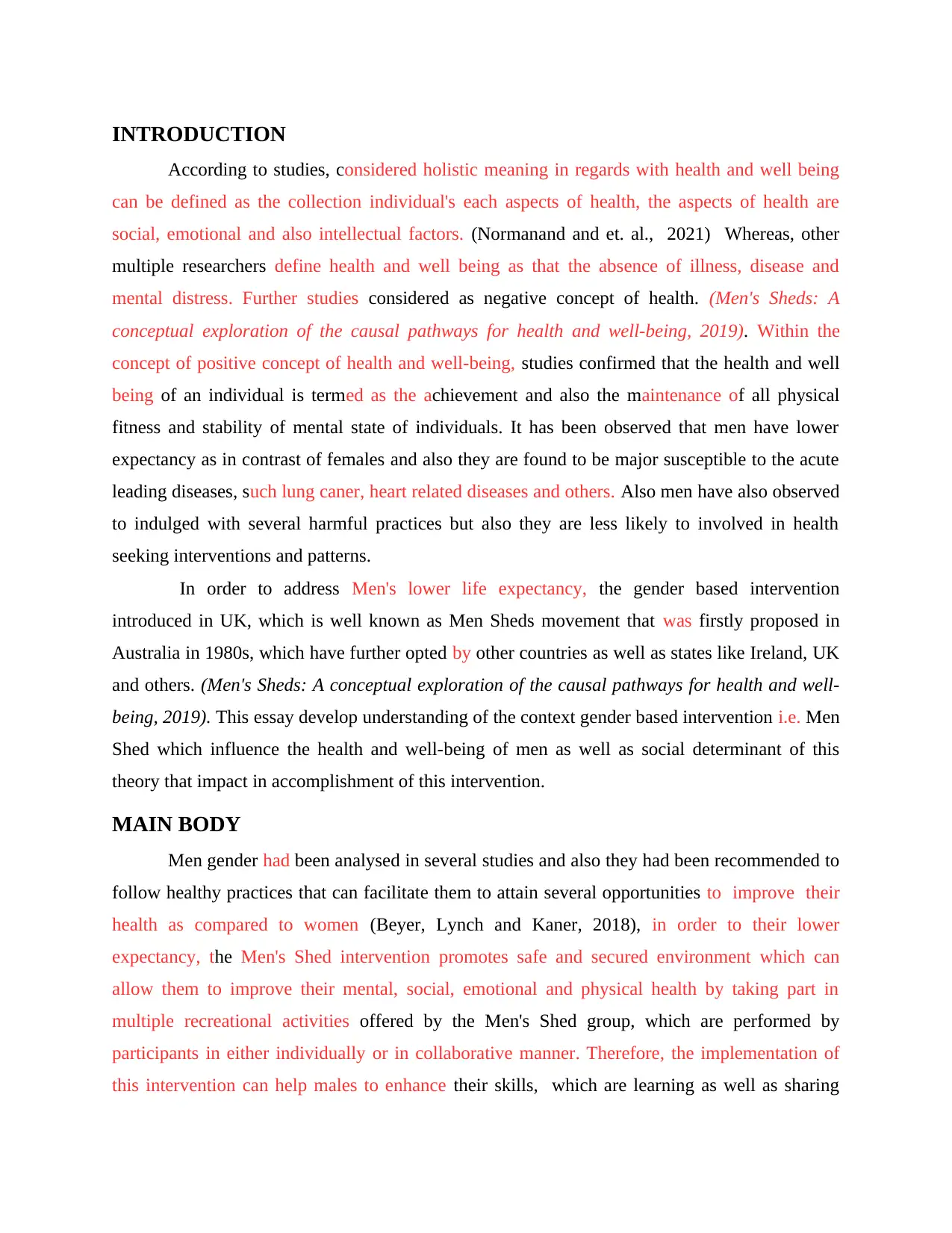
INTRODUCTION
According to studies, considered holistic meaning in regards with health and well being
can be defined as the collection individual's each aspects of health, the aspects of health are
social, emotional and also intellectual factors. (Normanand and et. al., 2021) Whereas, other
multiple researchers define health and well being as that the absence of illness, disease and
mental distress. Further studies considered as negative concept of health. (Men's Sheds: A
conceptual exploration of the causal pathways for health and well-being, 2019). Within the
concept of positive concept of health and well-being, studies confirmed that the health and well
being of an individual is termed as the achievement and also the maintenance of all physical
fitness and stability of mental state of individuals. It has been observed that men have lower
expectancy as in contrast of females and also they are found to be major susceptible to the acute
leading diseases, such lung caner, heart related diseases and others. Also men have also observed
to indulged with several harmful practices but also they are less likely to involved in health
seeking interventions and patterns.
In order to address Men's lower life expectancy, the gender based intervention
introduced in UK, which is well known as Men Sheds movement that was firstly proposed in
Australia in 1980s, which have further opted by other countries as well as states like Ireland, UK
and others. (Men's Sheds: A conceptual exploration of the causal pathways for health and well-
being, 2019). This essay develop understanding of the context gender based intervention i.e. Men
Shed which influence the health and well-being of men as well as social determinant of this
theory that impact in accomplishment of this intervention.
MAIN BODY
Men gender had been analysed in several studies and also they had been recommended to
follow healthy practices that can facilitate them to attain several opportunities to improve their
health as compared to women (Beyer, Lynch and Kaner, 2018), in order to their lower
expectancy, the Men's Shed intervention promotes safe and secured environment which can
allow them to improve their mental, social, emotional and physical health by taking part in
multiple recreational activities offered by the Men's Shed group, which are performed by
participants in either individually or in collaborative manner. Therefore, the implementation of
this intervention can help males to enhance their skills, which are learning as well as sharing
According to studies, considered holistic meaning in regards with health and well being
can be defined as the collection individual's each aspects of health, the aspects of health are
social, emotional and also intellectual factors. (Normanand and et. al., 2021) Whereas, other
multiple researchers define health and well being as that the absence of illness, disease and
mental distress. Further studies considered as negative concept of health. (Men's Sheds: A
conceptual exploration of the causal pathways for health and well-being, 2019). Within the
concept of positive concept of health and well-being, studies confirmed that the health and well
being of an individual is termed as the achievement and also the maintenance of all physical
fitness and stability of mental state of individuals. It has been observed that men have lower
expectancy as in contrast of females and also they are found to be major susceptible to the acute
leading diseases, such lung caner, heart related diseases and others. Also men have also observed
to indulged with several harmful practices but also they are less likely to involved in health
seeking interventions and patterns.
In order to address Men's lower life expectancy, the gender based intervention
introduced in UK, which is well known as Men Sheds movement that was firstly proposed in
Australia in 1980s, which have further opted by other countries as well as states like Ireland, UK
and others. (Men's Sheds: A conceptual exploration of the causal pathways for health and well-
being, 2019). This essay develop understanding of the context gender based intervention i.e. Men
Shed which influence the health and well-being of men as well as social determinant of this
theory that impact in accomplishment of this intervention.
MAIN BODY
Men gender had been analysed in several studies and also they had been recommended to
follow healthy practices that can facilitate them to attain several opportunities to improve their
health as compared to women (Beyer, Lynch and Kaner, 2018), in order to their lower
expectancy, the Men's Shed intervention promotes safe and secured environment which can
allow them to improve their mental, social, emotional and physical health by taking part in
multiple recreational activities offered by the Men's Shed group, which are performed by
participants in either individually or in collaborative manner. Therefore, the implementation of
this intervention can help males to enhance their skills, which are learning as well as sharing
⊘ This is a preview!⊘
Do you want full access?
Subscribe today to unlock all pages.

Trusted by 1+ million students worldwide
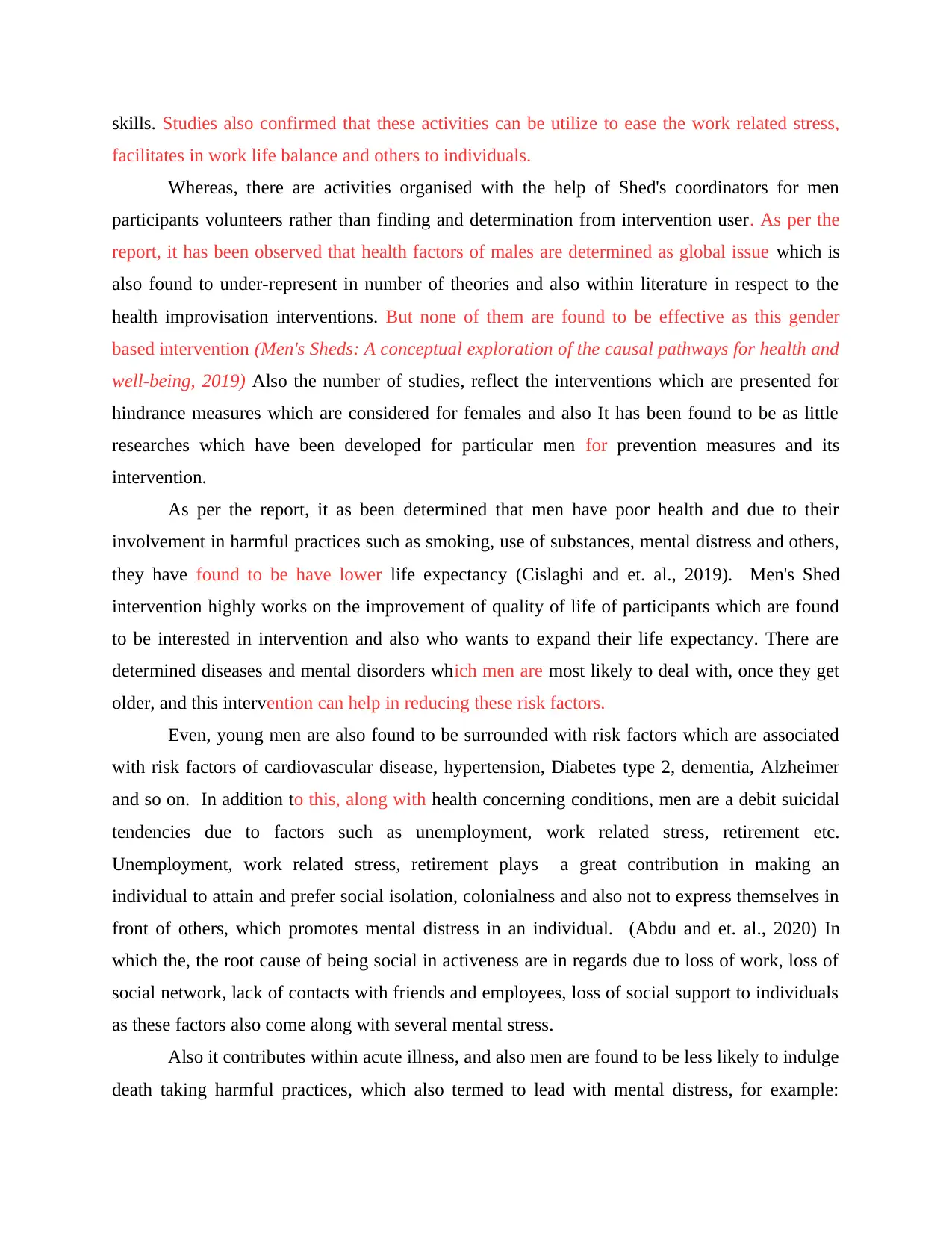
skills. Studies also confirmed that these activities can be utilize to ease the work related stress,
facilitates in work life balance and others to individuals.
Whereas, there are activities organised with the help of Shed's coordinators for men
participants volunteers rather than finding and determination from intervention user. As per the
report, it has been observed that health factors of males are determined as global issue which is
also found to under-represent in number of theories and also within literature in respect to the
health improvisation interventions. But none of them are found to be effective as this gender
based intervention (Men's Sheds: A conceptual exploration of the causal pathways for health and
well-being, 2019) Also the number of studies, reflect the interventions which are presented for
hindrance measures which are considered for females and also It has been found to be as little
researches which have been developed for particular men for prevention measures and its
intervention.
As per the report, it as been determined that men have poor health and due to their
involvement in harmful practices such as smoking, use of substances, mental distress and others,
they have found to be have lower life expectancy (Cislaghi and et. al., 2019). Men's Shed
intervention highly works on the improvement of quality of life of participants which are found
to be interested in intervention and also who wants to expand their life expectancy. There are
determined diseases and mental disorders which men are most likely to deal with, once they get
older, and this intervention can help in reducing these risk factors.
Even, young men are also found to be surrounded with risk factors which are associated
with risk factors of cardiovascular disease, hypertension, Diabetes type 2, dementia, Alzheimer
and so on. In addition to this, along with health concerning conditions, men are a debit suicidal
tendencies due to factors such as unemployment, work related stress, retirement etc.
Unemployment, work related stress, retirement plays a great contribution in making an
individual to attain and prefer social isolation, colonialness and also not to express themselves in
front of others, which promotes mental distress in an individual. (Abdu and et. al., 2020) In
which the, the root cause of being social in activeness are in regards due to loss of work, loss of
social network, lack of contacts with friends and employees, loss of social support to individuals
as these factors also come along with several mental stress.
Also it contributes within acute illness, and also men are found to be less likely to indulge
death taking harmful practices, which also termed to lead with mental distress, for example:
facilitates in work life balance and others to individuals.
Whereas, there are activities organised with the help of Shed's coordinators for men
participants volunteers rather than finding and determination from intervention user. As per the
report, it has been observed that health factors of males are determined as global issue which is
also found to under-represent in number of theories and also within literature in respect to the
health improvisation interventions. But none of them are found to be effective as this gender
based intervention (Men's Sheds: A conceptual exploration of the causal pathways for health and
well-being, 2019) Also the number of studies, reflect the interventions which are presented for
hindrance measures which are considered for females and also It has been found to be as little
researches which have been developed for particular men for prevention measures and its
intervention.
As per the report, it as been determined that men have poor health and due to their
involvement in harmful practices such as smoking, use of substances, mental distress and others,
they have found to be have lower life expectancy (Cislaghi and et. al., 2019). Men's Shed
intervention highly works on the improvement of quality of life of participants which are found
to be interested in intervention and also who wants to expand their life expectancy. There are
determined diseases and mental disorders which men are most likely to deal with, once they get
older, and this intervention can help in reducing these risk factors.
Even, young men are also found to be surrounded with risk factors which are associated
with risk factors of cardiovascular disease, hypertension, Diabetes type 2, dementia, Alzheimer
and so on. In addition to this, along with health concerning conditions, men are a debit suicidal
tendencies due to factors such as unemployment, work related stress, retirement etc.
Unemployment, work related stress, retirement plays a great contribution in making an
individual to attain and prefer social isolation, colonialness and also not to express themselves in
front of others, which promotes mental distress in an individual. (Abdu and et. al., 2020) In
which the, the root cause of being social in activeness are in regards due to loss of work, loss of
social network, lack of contacts with friends and employees, loss of social support to individuals
as these factors also come along with several mental stress.
Also it contributes within acute illness, and also men are found to be less likely to indulge
death taking harmful practices, which also termed to lead with mental distress, for example:
Paraphrase This Document
Need a fresh take? Get an instant paraphrase of this document with our AI Paraphraser
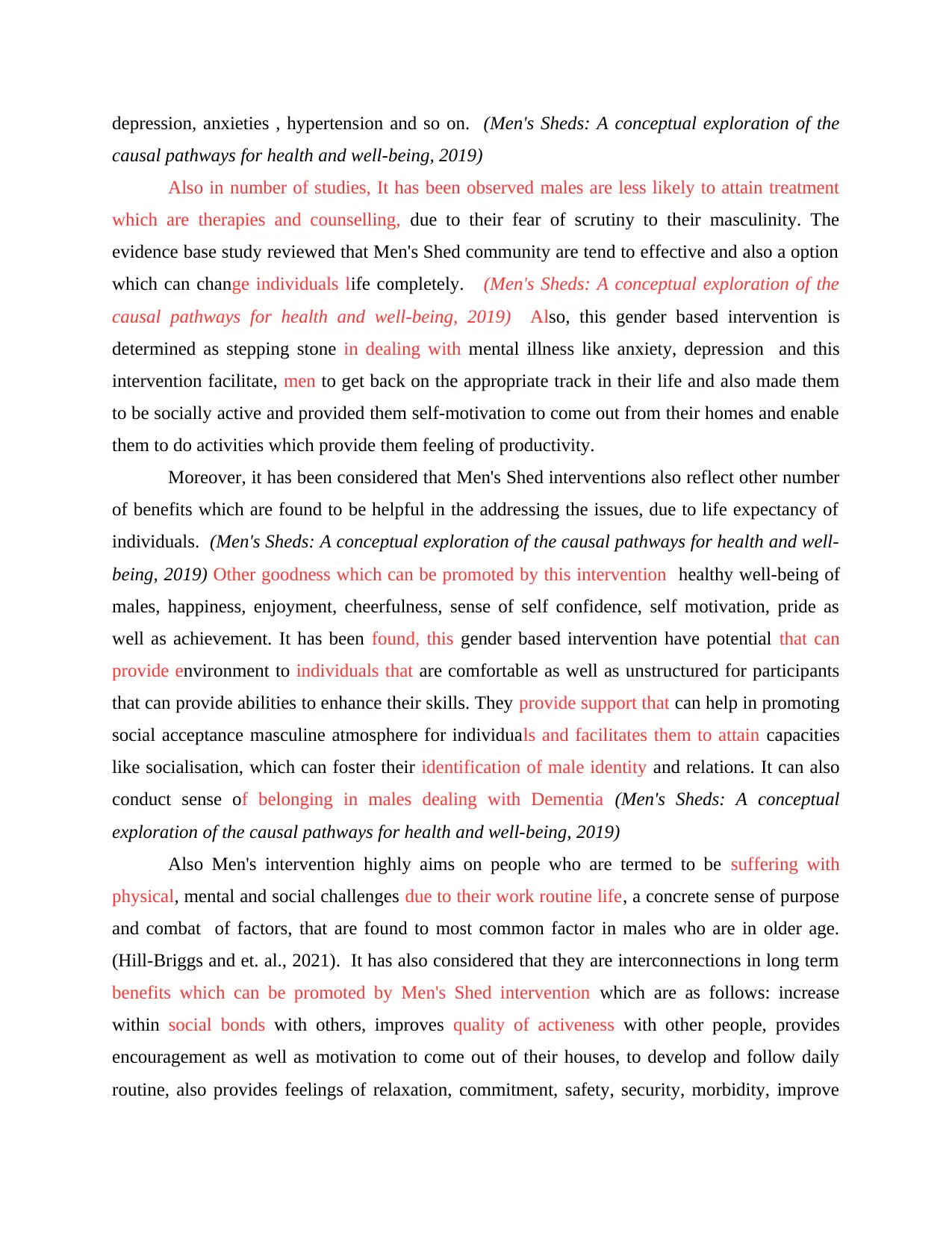
depression, anxieties , hypertension and so on. (Men's Sheds: A conceptual exploration of the
causal pathways for health and well-being, 2019)
Also in number of studies, It has been observed males are less likely to attain treatment
which are therapies and counselling, due to their fear of scrutiny to their masculinity. The
evidence base study reviewed that Men's Shed community are tend to effective and also a option
which can change individuals life completely. (Men's Sheds: A conceptual exploration of the
causal pathways for health and well-being, 2019) Also, this gender based intervention is
determined as stepping stone in dealing with mental illness like anxiety, depression and this
intervention facilitate, men to get back on the appropriate track in their life and also made them
to be socially active and provided them self-motivation to come out from their homes and enable
them to do activities which provide them feeling of productivity.
Moreover, it has been considered that Men's Shed interventions also reflect other number
of benefits which are found to be helpful in the addressing the issues, due to life expectancy of
individuals. (Men's Sheds: A conceptual exploration of the causal pathways for health and well-
being, 2019) Other goodness which can be promoted by this intervention healthy well-being of
males, happiness, enjoyment, cheerfulness, sense of self confidence, self motivation, pride as
well as achievement. It has been found, this gender based intervention have potential that can
provide environment to individuals that are comfortable as well as unstructured for participants
that can provide abilities to enhance their skills. They provide support that can help in promoting
social acceptance masculine atmosphere for individuals and facilitates them to attain capacities
like socialisation, which can foster their identification of male identity and relations. It can also
conduct sense of belonging in males dealing with Dementia (Men's Sheds: A conceptual
exploration of the causal pathways for health and well-being, 2019)
Also Men's intervention highly aims on people who are termed to be suffering with
physical, mental and social challenges due to their work routine life, a concrete sense of purpose
and combat of factors, that are found to most common factor in males who are in older age.
(Hill-Briggs and et. al., 2021). It has also considered that they are interconnections in long term
benefits which can be promoted by Men's Shed intervention which are as follows: increase
within social bonds with others, improves quality of activeness with other people, provides
encouragement as well as motivation to come out of their houses, to develop and follow daily
routine, also provides feelings of relaxation, commitment, safety, security, morbidity, improve
causal pathways for health and well-being, 2019)
Also in number of studies, It has been observed males are less likely to attain treatment
which are therapies and counselling, due to their fear of scrutiny to their masculinity. The
evidence base study reviewed that Men's Shed community are tend to effective and also a option
which can change individuals life completely. (Men's Sheds: A conceptual exploration of the
causal pathways for health and well-being, 2019) Also, this gender based intervention is
determined as stepping stone in dealing with mental illness like anxiety, depression and this
intervention facilitate, men to get back on the appropriate track in their life and also made them
to be socially active and provided them self-motivation to come out from their homes and enable
them to do activities which provide them feeling of productivity.
Moreover, it has been considered that Men's Shed interventions also reflect other number
of benefits which are found to be helpful in the addressing the issues, due to life expectancy of
individuals. (Men's Sheds: A conceptual exploration of the causal pathways for health and well-
being, 2019) Other goodness which can be promoted by this intervention healthy well-being of
males, happiness, enjoyment, cheerfulness, sense of self confidence, self motivation, pride as
well as achievement. It has been found, this gender based intervention have potential that can
provide environment to individuals that are comfortable as well as unstructured for participants
that can provide abilities to enhance their skills. They provide support that can help in promoting
social acceptance masculine atmosphere for individuals and facilitates them to attain capacities
like socialisation, which can foster their identification of male identity and relations. It can also
conduct sense of belonging in males dealing with Dementia (Men's Sheds: A conceptual
exploration of the causal pathways for health and well-being, 2019)
Also Men's intervention highly aims on people who are termed to be suffering with
physical, mental and social challenges due to their work routine life, a concrete sense of purpose
and combat of factors, that are found to most common factor in males who are in older age.
(Hill-Briggs and et. al., 2021). It has also considered that they are interconnections in long term
benefits which can be promoted by Men's Shed intervention which are as follows: increase
within social bonds with others, improves quality of activeness with other people, provides
encouragement as well as motivation to come out of their houses, to develop and follow daily
routine, also provides feelings of relaxation, commitment, safety, security, morbidity, improve
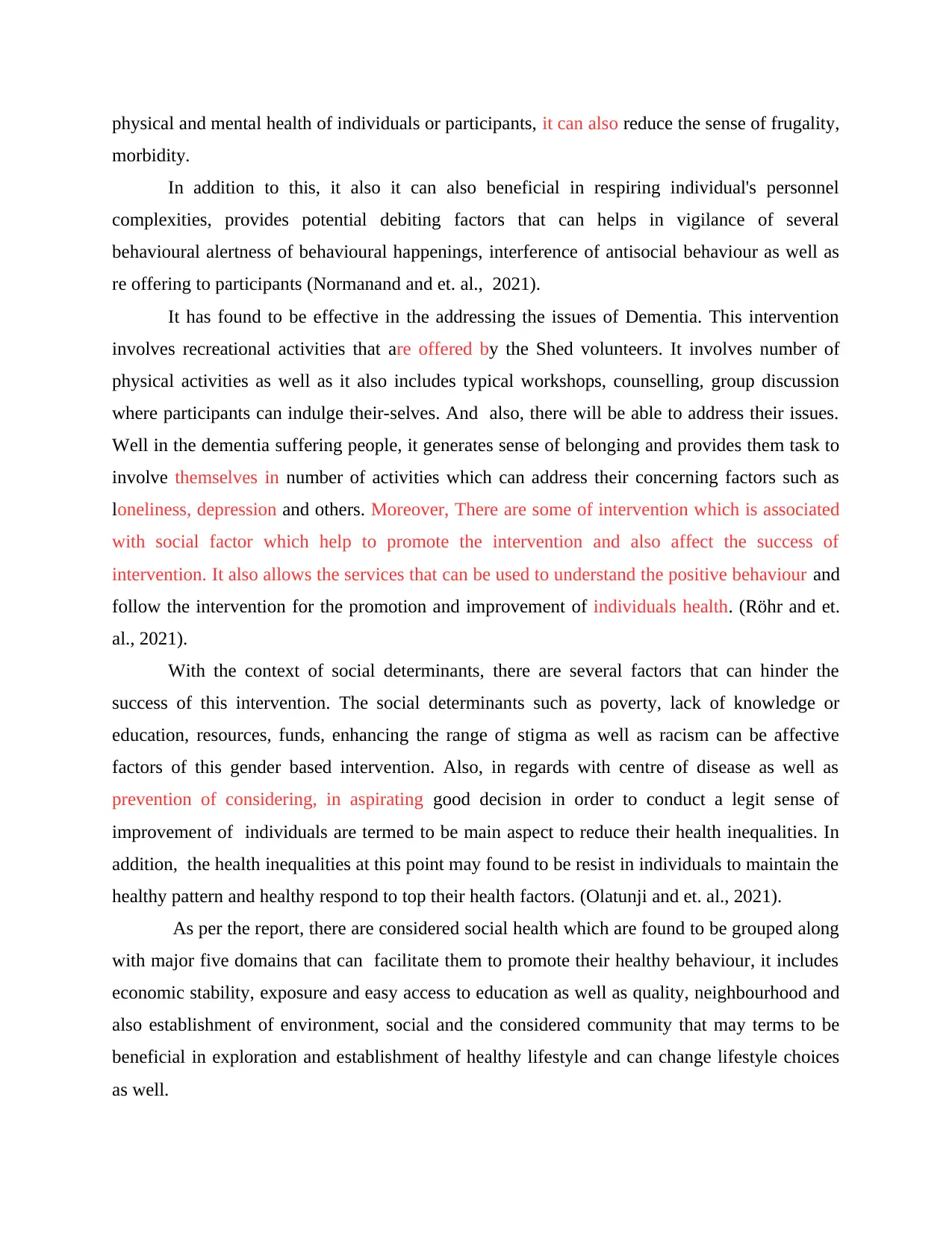
physical and mental health of individuals or participants, it can also reduce the sense of frugality,
morbidity.
In addition to this, it also it can also beneficial in respiring individual's personnel
complexities, provides potential debiting factors that can helps in vigilance of several
behavioural alertness of behavioural happenings, interference of antisocial behaviour as well as
re offering to participants (Normanand and et. al., 2021).
It has found to be effective in the addressing the issues of Dementia. This intervention
involves recreational activities that are offered by the Shed volunteers. It involves number of
physical activities as well as it also includes typical workshops, counselling, group discussion
where participants can indulge their-selves. And also, there will be able to address their issues.
Well in the dementia suffering people, it generates sense of belonging and provides them task to
involve themselves in number of activities which can address their concerning factors such as
loneliness, depression and others. Moreover, There are some of intervention which is associated
with social factor which help to promote the intervention and also affect the success of
intervention. It also allows the services that can be used to understand the positive behaviour and
follow the intervention for the promotion and improvement of individuals health. (Röhr and et.
al., 2021).
With the context of social determinants, there are several factors that can hinder the
success of this intervention. The social determinants such as poverty, lack of knowledge or
education, resources, funds, enhancing the range of stigma as well as racism can be affective
factors of this gender based intervention. Also, in regards with centre of disease as well as
prevention of considering, in aspirating good decision in order to conduct a legit sense of
improvement of individuals are termed to be main aspect to reduce their health inequalities. In
addition, the health inequalities at this point may found to be resist in individuals to maintain the
healthy pattern and healthy respond to top their health factors. (Olatunji and et. al., 2021).
As per the report, there are considered social health which are found to be grouped along
with major five domains that can facilitate them to promote their healthy behaviour, it includes
economic stability, exposure and easy access to education as well as quality, neighbourhood and
also establishment of environment, social and the considered community that may terms to be
beneficial in exploration and establishment of healthy lifestyle and can change lifestyle choices
as well.
morbidity.
In addition to this, it also it can also beneficial in respiring individual's personnel
complexities, provides potential debiting factors that can helps in vigilance of several
behavioural alertness of behavioural happenings, interference of antisocial behaviour as well as
re offering to participants (Normanand and et. al., 2021).
It has found to be effective in the addressing the issues of Dementia. This intervention
involves recreational activities that are offered by the Shed volunteers. It involves number of
physical activities as well as it also includes typical workshops, counselling, group discussion
where participants can indulge their-selves. And also, there will be able to address their issues.
Well in the dementia suffering people, it generates sense of belonging and provides them task to
involve themselves in number of activities which can address their concerning factors such as
loneliness, depression and others. Moreover, There are some of intervention which is associated
with social factor which help to promote the intervention and also affect the success of
intervention. It also allows the services that can be used to understand the positive behaviour and
follow the intervention for the promotion and improvement of individuals health. (Röhr and et.
al., 2021).
With the context of social determinants, there are several factors that can hinder the
success of this intervention. The social determinants such as poverty, lack of knowledge or
education, resources, funds, enhancing the range of stigma as well as racism can be affective
factors of this gender based intervention. Also, in regards with centre of disease as well as
prevention of considering, in aspirating good decision in order to conduct a legit sense of
improvement of individuals are termed to be main aspect to reduce their health inequalities. In
addition, the health inequalities at this point may found to be resist in individuals to maintain the
healthy pattern and healthy respond to top their health factors. (Olatunji and et. al., 2021).
As per the report, there are considered social health which are found to be grouped along
with major five domains that can facilitate them to promote their healthy behaviour, it includes
economic stability, exposure and easy access to education as well as quality, neighbourhood and
also establishment of environment, social and the considered community that may terms to be
beneficial in exploration and establishment of healthy lifestyle and can change lifestyle choices
as well.
⊘ This is a preview!⊘
Do you want full access?
Subscribe today to unlock all pages.

Trusted by 1+ million students worldwide
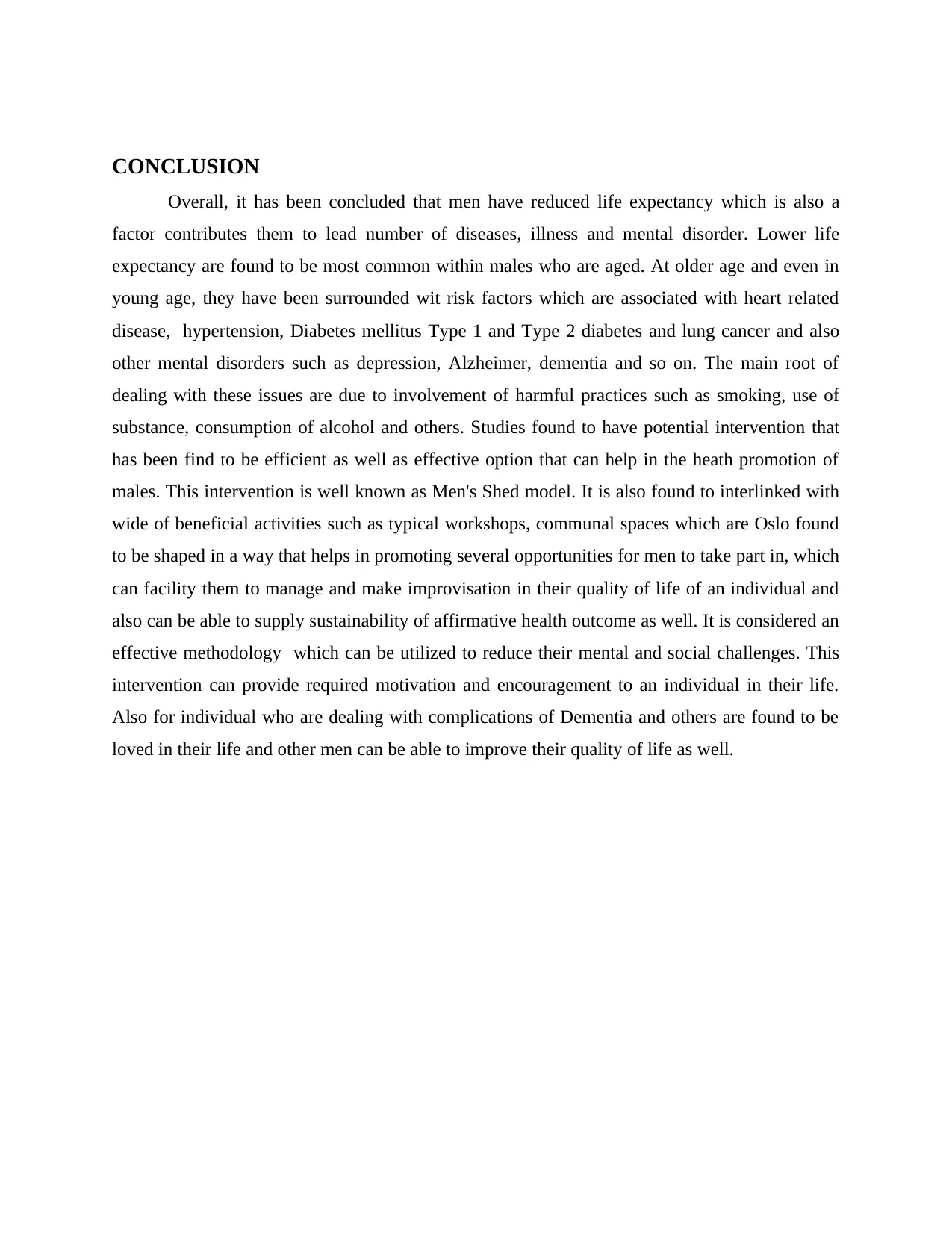
CONCLUSION
Overall, it has been concluded that men have reduced life expectancy which is also a
factor contributes them to lead number of diseases, illness and mental disorder. Lower life
expectancy are found to be most common within males who are aged. At older age and even in
young age, they have been surrounded wit risk factors which are associated with heart related
disease, hypertension, Diabetes mellitus Type 1 and Type 2 diabetes and lung cancer and also
other mental disorders such as depression, Alzheimer, dementia and so on. The main root of
dealing with these issues are due to involvement of harmful practices such as smoking, use of
substance, consumption of alcohol and others. Studies found to have potential intervention that
has been find to be efficient as well as effective option that can help in the heath promotion of
males. This intervention is well known as Men's Shed model. It is also found to interlinked with
wide of beneficial activities such as typical workshops, communal spaces which are Oslo found
to be shaped in a way that helps in promoting several opportunities for men to take part in, which
can facility them to manage and make improvisation in their quality of life of an individual and
also can be able to supply sustainability of affirmative health outcome as well. It is considered an
effective methodology which can be utilized to reduce their mental and social challenges. This
intervention can provide required motivation and encouragement to an individual in their life.
Also for individual who are dealing with complications of Dementia and others are found to be
loved in their life and other men can be able to improve their quality of life as well.
Overall, it has been concluded that men have reduced life expectancy which is also a
factor contributes them to lead number of diseases, illness and mental disorder. Lower life
expectancy are found to be most common within males who are aged. At older age and even in
young age, they have been surrounded wit risk factors which are associated with heart related
disease, hypertension, Diabetes mellitus Type 1 and Type 2 diabetes and lung cancer and also
other mental disorders such as depression, Alzheimer, dementia and so on. The main root of
dealing with these issues are due to involvement of harmful practices such as smoking, use of
substance, consumption of alcohol and others. Studies found to have potential intervention that
has been find to be efficient as well as effective option that can help in the heath promotion of
males. This intervention is well known as Men's Shed model. It is also found to interlinked with
wide of beneficial activities such as typical workshops, communal spaces which are Oslo found
to be shaped in a way that helps in promoting several opportunities for men to take part in, which
can facility them to manage and make improvisation in their quality of life of an individual and
also can be able to supply sustainability of affirmative health outcome as well. It is considered an
effective methodology which can be utilized to reduce their mental and social challenges. This
intervention can provide required motivation and encouragement to an individual in their life.
Also for individual who are dealing with complications of Dementia and others are found to be
loved in their life and other men can be able to improve their quality of life as well.
Paraphrase This Document
Need a fresh take? Get an instant paraphrase of this document with our AI Paraphraser
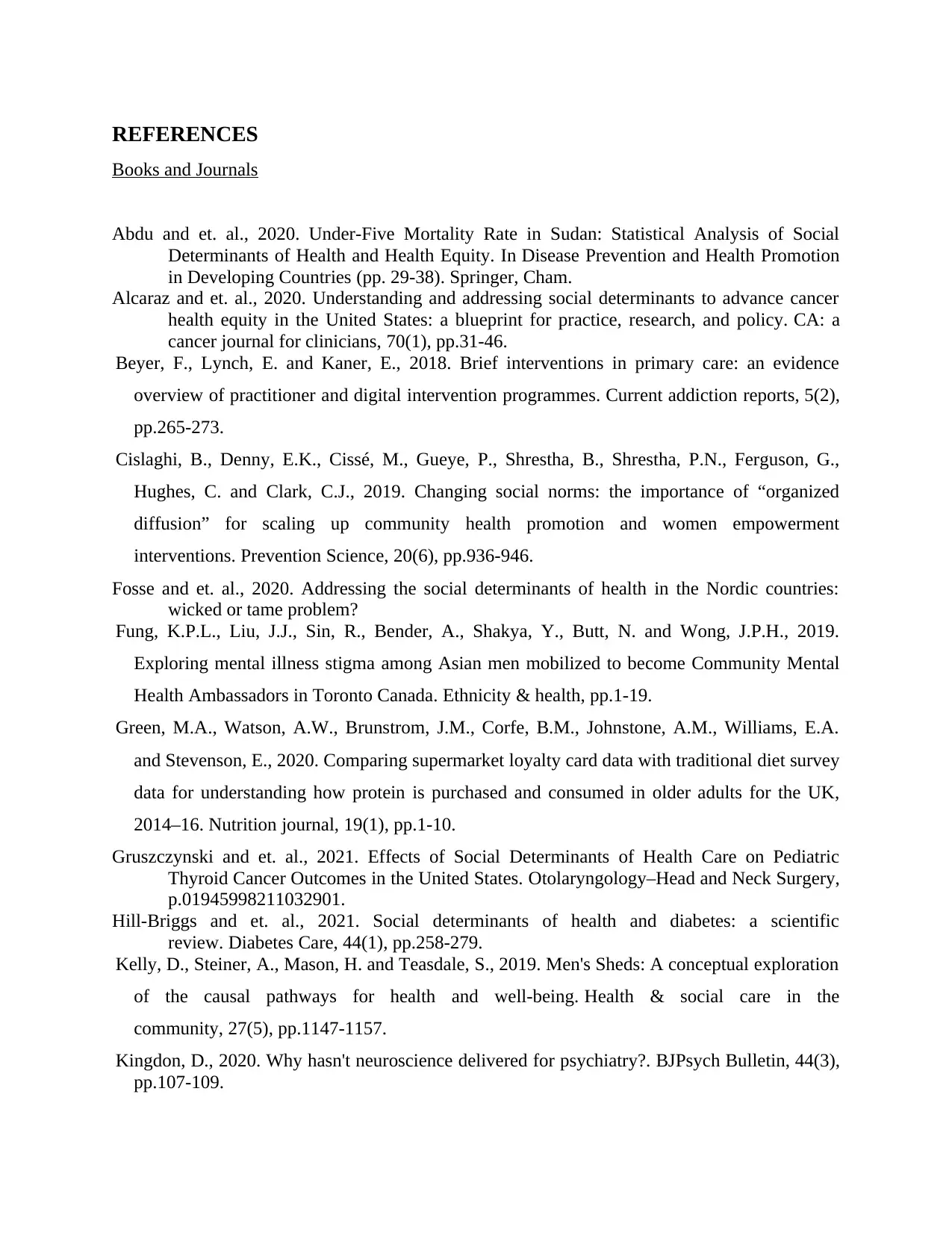
REFERENCES
Books and Journals
Abdu and et. al., 2020. Under-Five Mortality Rate in Sudan: Statistical Analysis of Social
Determinants of Health and Health Equity. In Disease Prevention and Health Promotion
in Developing Countries (pp. 29-38). Springer, Cham.
Alcaraz and et. al., 2020. Understanding and addressing social determinants to advance cancer
health equity in the United States: a blueprint for practice, research, and policy. CA: a
cancer journal for clinicians, 70(1), pp.31-46.
Beyer, F., Lynch, E. and Kaner, E., 2018. Brief interventions in primary care: an evidence
overview of practitioner and digital intervention programmes. Current addiction reports, 5(2),
pp.265-273.
Cislaghi, B., Denny, E.K., Cissé, M., Gueye, P., Shrestha, B., Shrestha, P.N., Ferguson, G.,
Hughes, C. and Clark, C.J., 2019. Changing social norms: the importance of “organized
diffusion” for scaling up community health promotion and women empowerment
interventions. Prevention Science, 20(6), pp.936-946.
Fosse and et. al., 2020. Addressing the social determinants of health in the Nordic countries:
wicked or tame problem?
Fung, K.P.L., Liu, J.J., Sin, R., Bender, A., Shakya, Y., Butt, N. and Wong, J.P.H., 2019.
Exploring mental illness stigma among Asian men mobilized to become Community Mental
Health Ambassadors in Toronto Canada. Ethnicity & health, pp.1-19.
Green, M.A., Watson, A.W., Brunstrom, J.M., Corfe, B.M., Johnstone, A.M., Williams, E.A.
and Stevenson, E., 2020. Comparing supermarket loyalty card data with traditional diet survey
data for understanding how protein is purchased and consumed in older adults for the UK,
2014–16. Nutrition journal, 19(1), pp.1-10.
Gruszczynski and et. al., 2021. Effects of Social Determinants of Health Care on Pediatric
Thyroid Cancer Outcomes in the United States. Otolaryngology–Head and Neck Surgery,
p.01945998211032901.
Hill-Briggs and et. al., 2021. Social determinants of health and diabetes: a scientific
review. Diabetes Care, 44(1), pp.258-279.
Kelly, D., Steiner, A., Mason, H. and Teasdale, S., 2019. Men's Sheds: A conceptual exploration
of the causal pathways for health and well‐being. Health & social care in the
community, 27(5), pp.1147-1157.
Kingdon, D., 2020. Why hasn't neuroscience delivered for psychiatry?. BJPsych Bulletin, 44(3),
pp.107-109.
Books and Journals
Abdu and et. al., 2020. Under-Five Mortality Rate in Sudan: Statistical Analysis of Social
Determinants of Health and Health Equity. In Disease Prevention and Health Promotion
in Developing Countries (pp. 29-38). Springer, Cham.
Alcaraz and et. al., 2020. Understanding and addressing social determinants to advance cancer
health equity in the United States: a blueprint for practice, research, and policy. CA: a
cancer journal for clinicians, 70(1), pp.31-46.
Beyer, F., Lynch, E. and Kaner, E., 2018. Brief interventions in primary care: an evidence
overview of practitioner and digital intervention programmes. Current addiction reports, 5(2),
pp.265-273.
Cislaghi, B., Denny, E.K., Cissé, M., Gueye, P., Shrestha, B., Shrestha, P.N., Ferguson, G.,
Hughes, C. and Clark, C.J., 2019. Changing social norms: the importance of “organized
diffusion” for scaling up community health promotion and women empowerment
interventions. Prevention Science, 20(6), pp.936-946.
Fosse and et. al., 2020. Addressing the social determinants of health in the Nordic countries:
wicked or tame problem?
Fung, K.P.L., Liu, J.J., Sin, R., Bender, A., Shakya, Y., Butt, N. and Wong, J.P.H., 2019.
Exploring mental illness stigma among Asian men mobilized to become Community Mental
Health Ambassadors in Toronto Canada. Ethnicity & health, pp.1-19.
Green, M.A., Watson, A.W., Brunstrom, J.M., Corfe, B.M., Johnstone, A.M., Williams, E.A.
and Stevenson, E., 2020. Comparing supermarket loyalty card data with traditional diet survey
data for understanding how protein is purchased and consumed in older adults for the UK,
2014–16. Nutrition journal, 19(1), pp.1-10.
Gruszczynski and et. al., 2021. Effects of Social Determinants of Health Care on Pediatric
Thyroid Cancer Outcomes in the United States. Otolaryngology–Head and Neck Surgery,
p.01945998211032901.
Hill-Briggs and et. al., 2021. Social determinants of health and diabetes: a scientific
review. Diabetes Care, 44(1), pp.258-279.
Kelly, D., Steiner, A., Mason, H. and Teasdale, S., 2019. Men's Sheds: A conceptual exploration
of the causal pathways for health and well‐being. Health & social care in the
community, 27(5), pp.1147-1157.
Kingdon, D., 2020. Why hasn't neuroscience delivered for psychiatry?. BJPsych Bulletin, 44(3),
pp.107-109.
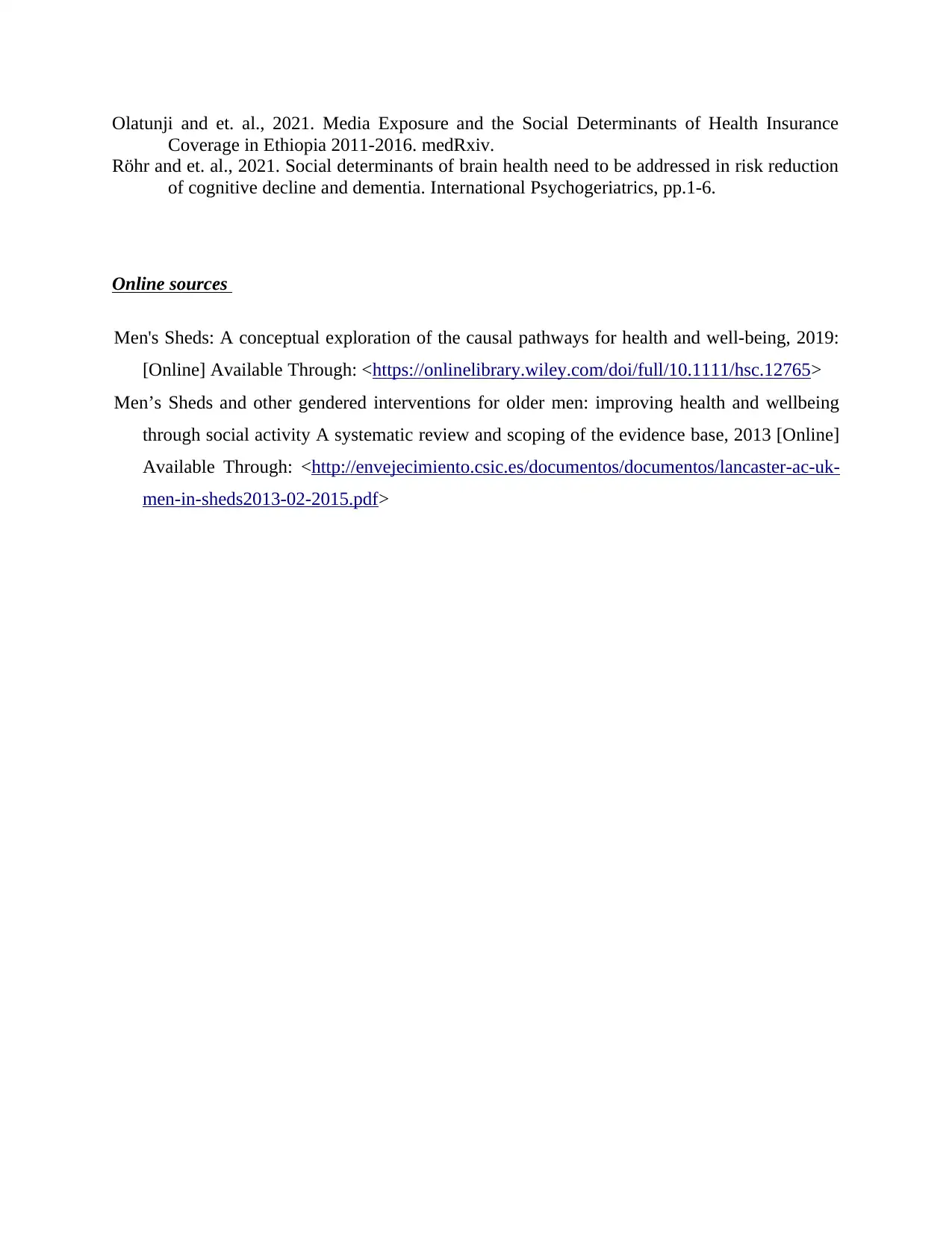
Olatunji and et. al., 2021. Media Exposure and the Social Determinants of Health Insurance
Coverage in Ethiopia 2011-2016. medRxiv.
Röhr and et. al., 2021. Social determinants of brain health need to be addressed in risk reduction
of cognitive decline and dementia. International Psychogeriatrics, pp.1-6.
Online sources
Men's Sheds: A conceptual exploration of the causal pathways for health and well-being, 2019:
[Online] Available Through: <https://onlinelibrary.wiley.com/doi/full/10.1111/hsc.12765>
Men’s Sheds and other gendered interventions for older men: improving health and wellbeing
through social activity A systematic review and scoping of the evidence base, 2013 [Online]
Available Through: <http://envejecimiento.csic.es/documentos/documentos/lancaster-ac-uk-
men-in-sheds2013-02-2015.pdf>
Coverage in Ethiopia 2011-2016. medRxiv.
Röhr and et. al., 2021. Social determinants of brain health need to be addressed in risk reduction
of cognitive decline and dementia. International Psychogeriatrics, pp.1-6.
Online sources
Men's Sheds: A conceptual exploration of the causal pathways for health and well-being, 2019:
[Online] Available Through: <https://onlinelibrary.wiley.com/doi/full/10.1111/hsc.12765>
Men’s Sheds and other gendered interventions for older men: improving health and wellbeing
through social activity A systematic review and scoping of the evidence base, 2013 [Online]
Available Through: <http://envejecimiento.csic.es/documentos/documentos/lancaster-ac-uk-
men-in-sheds2013-02-2015.pdf>
⊘ This is a preview!⊘
Do you want full access?
Subscribe today to unlock all pages.

Trusted by 1+ million students worldwide
1 out of 9
Related Documents
Your All-in-One AI-Powered Toolkit for Academic Success.
+13062052269
info@desklib.com
Available 24*7 on WhatsApp / Email
![[object Object]](/_next/static/media/star-bottom.7253800d.svg)
Unlock your academic potential
Copyright © 2020–2025 A2Z Services. All Rights Reserved. Developed and managed by ZUCOL.




